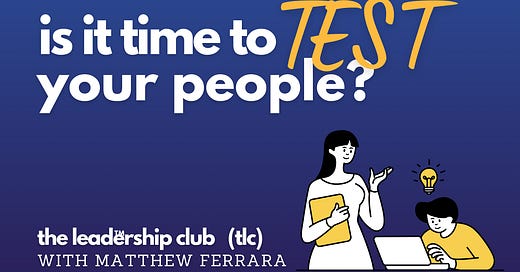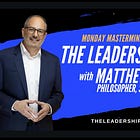Is it Time to Test Your People?
How the right assessments provide the right data to develop your people for the future
In the fast-paced business of real estate, top-notch people remain your most competitive advantage. But how do you ensure your people are ready with the right skills for the right times? The answer is frequent testing to tailor training, management and goals to meet the consumer, market and competitive needs of the day.
Let me explain.
Ready to take your leadership to the next level? Invest in yourself by upgrading your subscription and join the bi-weekly Masterminds, Deep Dives webinars, and coaching sessions. Try it free for 30 days and strengthen your confidence and competence as a leader today. Learn more or click to upgrade today.
Why Testing Matters
In the US, over $98 billion is spent annually on training and development across all industries. Even if your budget is a fraction of this, testing your managers, staff, and salespeople before offering training is crucial. As my friend Mike Staver says, "prescription before diagnosis is malpractice." Unfortunately, many training efforts focus on interesting, popular, and affordable topics that don't make the right impact at the right time.
Benefits of Frequent Testing
Targeted Training: Tests help you train people based on their current skill levels, not assumptions. This ensures that your training addresses actual needs.
Strategic Alignment: Tests ensure your training efforts align with your growth priorities, rather than relying on a "one size fits all" approach.
Did you miss this session? Remember, all sessions are recorded for unlimited playback!
Before You Begin Testing
Align your testing efforts with two key components:
The Marketplace: Understand current trends in customer and stakeholder value. Know what they need to achieve their goals in today's market. Test your people on the skills, traits, and behaviors necessary to deliver that value. Companies often fail to grow because they bring the wrong value to the market. Ensure your team's skills match customer expectations.
Your Strategy: Many organizations develop strategies that don't align with their growth priorities. This is especially true in brokerage organizations where the myth of "independent contractor" prevents alignment with market-share, pricing, and profitability goals. Testing helps identify the fit between your team's skills and your strategy, as well as areas of misalignment.
Types of Tests to Conduct Regularly
Sales Skills Assessments: Assess key skills such as agency law, prospecting, presentation abilities, negotiations, and closing techniques. Include marketing abilities and technology skills if relevant. Use role-playing scenarios, sales simulations, and interview-style models for objective testing.
Soft Skills Testing: Verbal communication, empathy, and problem-solving are crucial for leaders and sales teams. Use targeted tools for different soft skill areas and broad-based assessments like DiSC and Emotional Intelligence (EQ) surveys.
Business Needs Analysis: Assess time management, organizational skills, and financial acumen to pinpoint areas of operational excellence. Tools like StrengthsFinder can identify areas needing additional support or training.
Learning Styles and Preferences: Assess how your people prefer to learn and acquire new skills. Identify learning styles and preferences for in-person, online, or self-paced learning to accommodate diverse needs.
Let Testing Drive Your Efforts and Engagement
With clear test results, you can invest in relevant and impactful training. This drives engagement and retention of information.
Vary the Techniques: Training should be more than information dumping. Incorporate interactive aspects like group discussions, activities, case studies, and real-world role-playing to apply new skills practically. Reinforce confidence and knowledge by integrating opportunities to "try and apply" during learning.
Monitor Application After Class: Training is the start of growth, not the end. Monitor the application of new knowledge and skills on key strategic priorities and market needs. Performance monitoring helps evaluate the impact of training efforts on reducing risk, expanding sales, recruiting new talent, or driving profitability goals. Tie training efforts to specific performance metrics and set up a cadence of measurability to monitor results.
TLC Assessment Tools
There are lots of assessment tools that are affordable (some are even free) that you can use to test people’s soft skills, sales skills and industry-specific abilities. Some of my favorite include:
The EQ assessment in Emotional Intelligence 2.0 by Bradberry and Greaves
Gallup’s Clifton Strengthsfinder assessment, about $60 online
DiSC Assessment for work styles and behavioral habits (about $99 online)
Harrison Assessments, which uses a custom-profile from your best internal performers to assess current and future talent (custom prices)
TalentQuest, who I’ve used for years, to develop high-performing candidate profiles specifically in real estate sales, management and support
Dozens of quick quizzes and assessments (most around $10) at MindTools.com
While you consider some of those sources of professional assessment and skill evaluations, don’t forget that we have a few business-planning tools that help our TLC members assess their salespeople’s abilities when doing coaching and business development, in our Digital Downloads page, including:
Change management ebooks
Business plan assessment for sustainable sales strategy
Stay interviews, to evaluate goals and needs
Business development spreadsheet to plan listings/buyer business mix
Plus the workbook from our Business Planning Workshop (TLC members, free online) includes page 9, a personal skills self-assessment. Get it in the notes from the webinar below:
TLC Deep Dive Better Business Planning
Thanks to everyone who attended our latest TLC Deep Dive on Better Business Planning!









